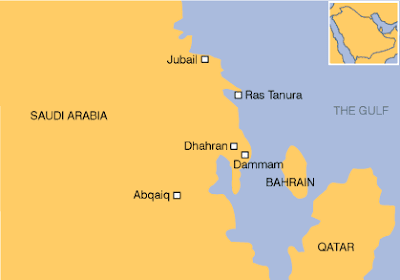SPECIAL REPORT: The Geopolitical Ramifications of the Saudi oilfield attacks
By: Iain Fraser
Málaga News Centre
The US has clearly identified Iran as the state actor directly responsible for the drone attack that wiped out the Saudi-owned Aramco oil facilities in Abqaiq and Khurai despite full responsibility having been asserted by Houthi rebels the Iran-aligned rebel army that has been fighting a Saudi-led military coalition in neighbouring Yemen for the past four years.
News of the attacks jolted the financial markets, sending the oil price soaring with a barrel of Brent crude surging by almost 20% from $60 to $72. It eased back to $66 per barrel after US President, Donald Trump pledged to release some of America’s oil reserves, to make up the shortfall from Saudi Arabia although market analysts believe the oil price could rise higher if Aramco cannot bring supplies back online quickly, or if there is military action in the Gulf.
Higher oil prices can drag on global growth. It pushes up transport costs and the prices of petroleum-based products. This fuels inflation, leaving consumers with less disposable income.
The Geopolitical Ramifications
Abqaiq is the world’s largest oil processing facility, where about two-thirds of the total Saudi supply is refined, as such it is supposed to be a highly tech fortress with extraordinarily high security protocols clearly way above the skill-set of the average Houthi guerrilla. However, the fact that it has been severely disrupted is a sign that the world’s energy infrastructure is highly vulnerable and is now considered a legitimate target.
While Saudi pipelines, oil installations and tankers have been sporadically attacked over the past two years, intelligence insiders say what happened in eastern Saudi Arabia in the early hours of Saturday morning is a much larger escalation with one commentator quoted as saying that the strike was "a hit to the jugular of the KSAs oil industry."
Saudi Arabia, has been locked in a five-year war to dislodge the Houthi´s from Yemen’s capital Sana’a to stem the emergence of a secessionist movement in southern Yemen that is taking territory from the Saudi-backed unity government.
The Houthis are regarded as part of a network of militias in the Middle East who are sponsored or assisted in some way by Tehran, part of a broader fight to dominate the Middle East between Iran and Saudi Arabia that dates back to the Iranian revolution of 1979. The pair do not directly clash; the battle is playing out through proxy actors in Syria, Lebanon and Yemen, among other countries.
Iran continues to deny that it materially assists the Houthis but has become more openly supportive this year, inviting a Houthi spokesman to Tehran where he was praised as a “holy warrior” by the country’s supreme leader, Ayatollah Ali Khamenei.
The US has long maintained that the Houthi are far more than mere puppets and are a front for clandestine Iranian operations.
Although the Houthis recently acquired much more powerful drone technology that has given them the power to strike targets up to 1,500km away, according to the UN. Abqaiq is within about 1,000km of Houthi-held territory. In the past months, there have been unconfirmed reports of attacks by Houthi drones on civilian airports in Saudi Arabia, Abu Dhabi and Dubai.
However for the Houthi claim of responsibility to be true, their armed drones would have had to fly over nearly 1,000km from controlled territory in northwest Yemen across Saudi Arabia to reach their targets in Abqaiq and while few analysts doubt the Houthis’ drones capabilities have grown more sophisticated their basic drones simply do not have anything like the range needed.
But Saturday’s strikes would represent a marked increase in sophistication compared to those earlier attacks. Western and Saudi governments believe Iran has been assisting the Houthis to acquire and use the advanced drones – a charge both Tehran and the Yemeni rebels deny.
However, the US says there is no evidence the attack originated in Yemen and has squarely blamed it on Iran, seeing it as part of a pattern of threats to oil tankers and infrastructure in past months that it says Iran has carried out in response to sanctions on Iranian oil that are crippling the Islamic Republic’s economy.
It has also released satellite photos showing what officials said were at least 19 points of impact at the two Saudi energy facilities, including damage at the heart of the Abqaiq plant. Officials told US media the photos show impacts consistent with the attack coming from the direction of Iran or Iraq, rather than from Yemen to the south.
Therefore, it has the assistance of a greater power, enter Iran, despite Tehran uttering the usual mantra that it had nothing to do with Saturday’s attack. With my defence analysts hat on if I were calling the shots I would use the whole Houthi admission as brilliant cover my own clandestine ops and my state of the art kit. Just saying!
According to UN Special Envoy, Martin Griffiths said that even if that claim of responsibility is debunked, and the source of the drone attack proves to be Iranian-backed forces based in Iraq, as the US currently claims, the Houthi claim gave some credence to those contending “there is an axis between between Houthis and Iran”.
The UN envoy is calling for all sides to come together to hold wide-ranging political talks on the country’s future, although he has been reluctant to include the secessionist Southern Transitional Council in the talks process.
But diplomats fear Griffiths appeal may be ignored if Saudi Arabia joins the US in attributing responsibility for the attack to a nexus between the Houthis and Iran. The United Arab Emirates, Saudi Arabia’s allies in the war to dislodge the Houthis, have signalled they are withdrawing some forces from Yemen, and there was hope that Saudi might wind down an unwinnable war.
Who makes the next move?
Trump has already made a statement saying the US is “locked and loaded” and ready to respond to whoever carried out Saturday’s attack, hinting strongly that the US may see it as justification for a military strike on Iran. Of course any such action would carry a significant risk of escalation – a
course of action that Trump has previously been unwilling to take and certainly nothing like a "third world war"
In the short term, the strikes appear to have scuttled any momentum towards Trump meeting with the Iranian president, Hassan Rouhani, when the latter arrives in New York next week for the opening of the 74th UN general assembly. Although with Trump involved just about anything could happen.


_128.png)


_128.png)
